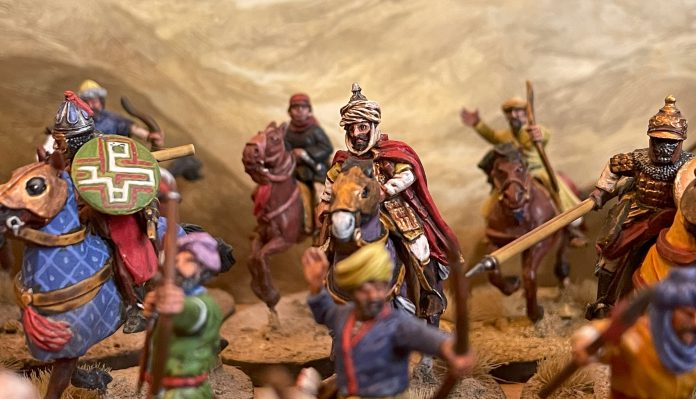The dizzying range of options available to you in making an Outremer warband presents a challenge and an opportunity. The challenge is making something that hangs together coherently, narrowing down your options to a list that holds to a theme. The opportunity is that the Outremer rules give you a wide range of tools to build lists that speak to the history of a particular place and time. What spoke to me on reading the Outremer rules was a specific place and time – the world of Usama Ibn Munqidh.
Usama Who?
Usama Ibn Munqidh, or to give him his full name according to Wikipedia Majd ad-Dīn Usāma ibn Murshid ibn ʿAlī ibn Munqidh al-Kināni al-Kalbī, was a 12th century poet, philosopher, author, noble, diplomat, raconteur, scholar and general “guy who likes to talk about things”. He’s a fascinating character, born right before the arrival of the First Crusade (born 1095), living through the slow rebuilding of Islamic power in the Levant and meeting just about all the major players of the period. Importantly, he provides a major chronicle of the Islamic world’s interaction with al Franj (the Crusaders) on military, cultural, religious and scientific grounds. He was a wide ranging kind of guy, mixing in specific examples of conflict with broad reminiscences on hunting, interesting things that he’d once heard, meditations on bravery and religion, phenomenal leopards he’d encountered. He wrote (or possibly dictated) his memoirs/religious meditations in a mix of highly stylised classical Arabic and probably pretty shocking to read at the time, middle Arabic. He’s highly conversational, very interesting and downright funny. He reminds me, very much, of Gerald of Wales – another raconteur and tale teller that’s a firm favourite on my bookshelf.
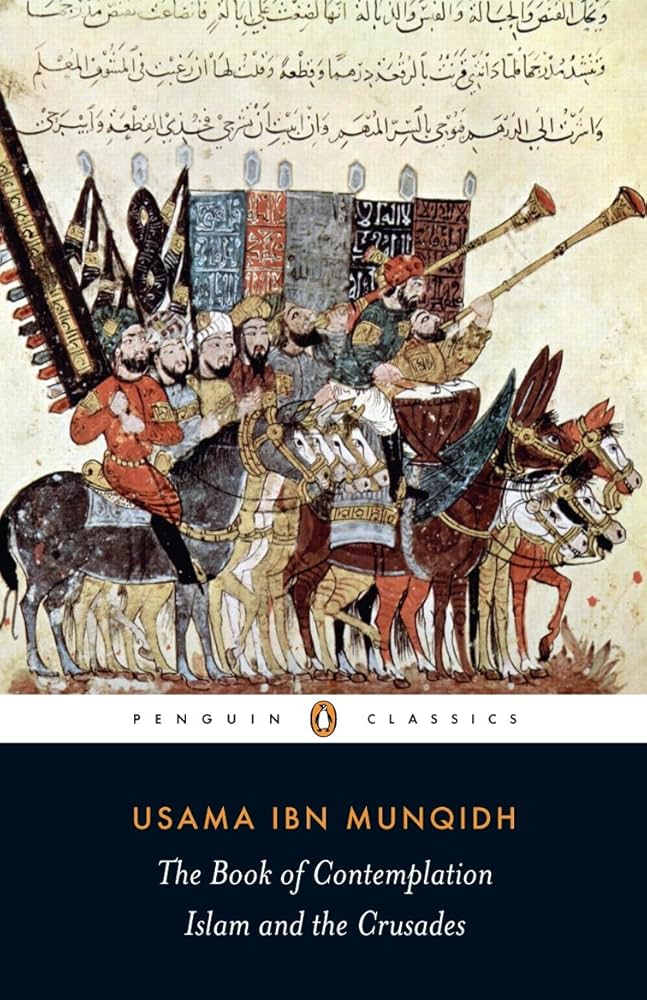
Usama is an important historical figure for his somewhat reliable histories, but also because he lived a long and very eventful life, moving from court to court in the Islamic world, often one step ahead of his enemies “unjustly” accusing him of meddling in cut throat politics and plotting coup attempts. He spent time in the Burid, Fatmid, Ayyubid and Zengid courts, meeting Caliphs, Saladin, Nur-al-Din and Zengi among many, many other prominent figures of the age, providing a unique and idiosyncratic window into the Crusades.
Usama’s Warband
As I’m building an Egypt based board, I want to use the opportunities and levers presented by Outremer to build up a force around Usama’s time in Egypt. This was, to put it mildly, a particular turbulent time for our raconteur-come-political-schemer, a twenty year stretch in which he fought with, against and for the Crusaders, Zengids and Burids. During that time, he accumulated a wide variety of hangers on, followers and soldiers, including Mamluk slave-soldiers and the occasional crusader. Best of all, he wrote about them a lot!
To start off I want to make a basic 500 point warband, striking a balance between boys and toys while populating the warband with characters from Usama’s memoirs. From my limited playing experience so far, I want to mix in cavalry and infantry – as much as I’d like to go full cavalry, I’m just not actually very good at games, particularly when playing brittle, fast, high-skill cavalry armies! Barons’ War Outremer can skew in many ways – Islamic forces can vary between mass infantry and highly armoured cavalry, with sprinklings of naptha throwers, assassins and religious fanatics.
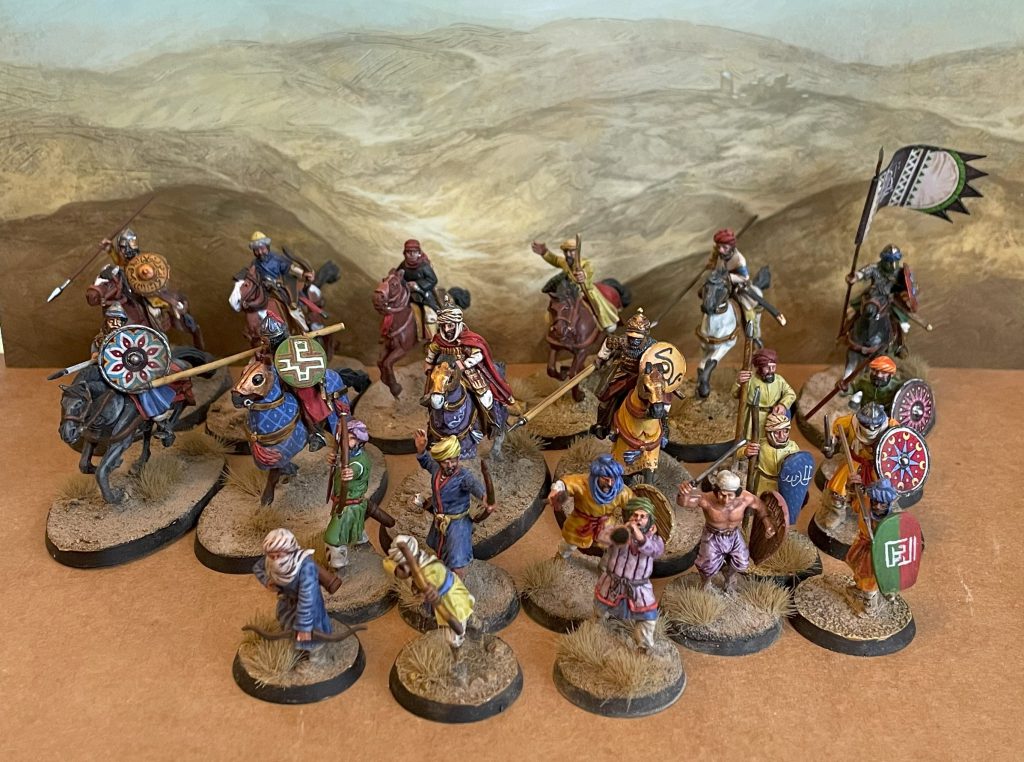
I like a balanced force, but the composition of this army isn’t up to me – it’s up to Usama. To pick my groups, skills and equipment, I’m going to go straight to the man himself, which means even though I thought I’d got it all painted… I haven’t.
The Man Himself
Usama was in Egypt in his thirties and forties, at times a very influential (and very wealthy) courtier trusted with highly sensitive diplomatic missions across the borders of the Islamic and Crusader worlds. He wasn’t a great general, though – albeit a fair warrior – so we’ll represent him in the Barons’ War as a veteran Sayyid, the lesser level of leader in Islamic forces.
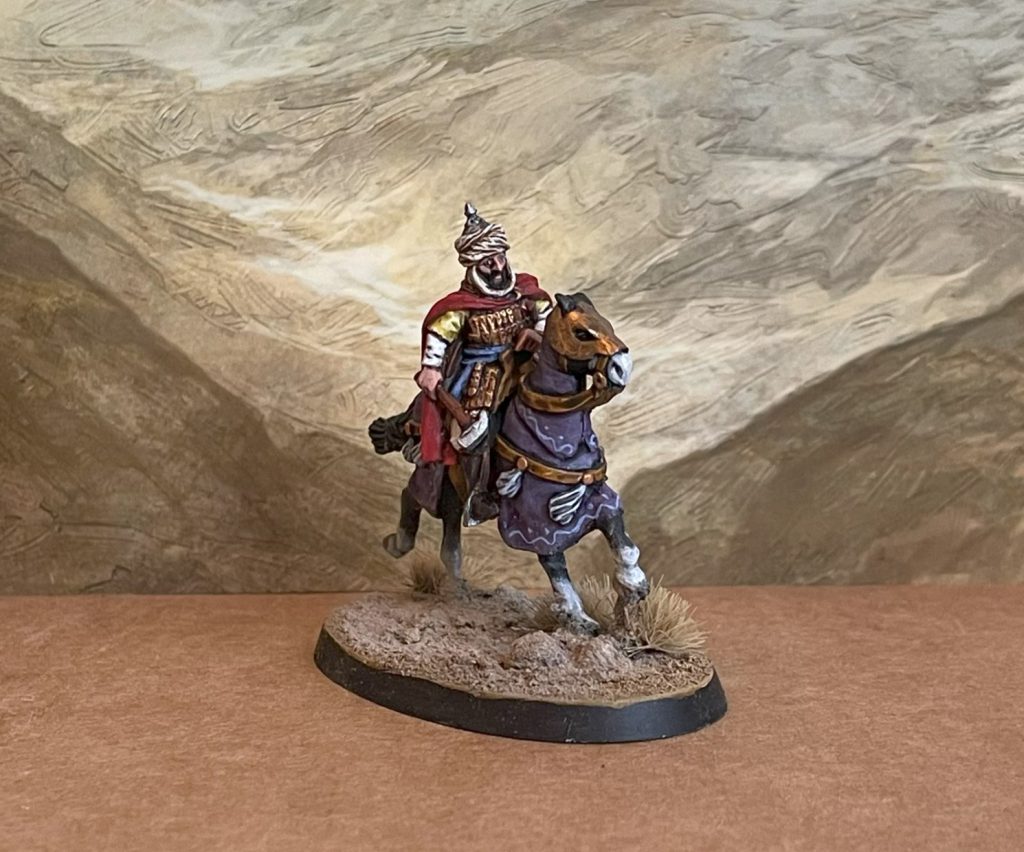
That makes him a good fighter, strong, brave and able to take multiple actions. Given his extensive writing about his excellent horsemanship, I’ll give him a barded horse and the best armour his extensive wealth could purchase – lamellar and mail. As an Islamic general, Usama has to take an Askar – a retinue trait representing the origins of the general. In this case the choice is pretty obvious, Usama lived within the Fatmid empire within an Arab tribe, giving us the Fatmid askar, allowing infantry to shoot ignoring nearby groups. We’ll have to take some infantry then!
With all that, Usama costs 42 points and can hold his own fairly well.
Mamluks and Command
Luckily for him, he probably won’t have to. Usama, as the occasional (don’t ask) heir to the Emirate of Shiazar, was a wealthy and important Faris (knight-ish) and that means his family owned Mamluk slave-soldiers. Mamluks are a particularly interesting phenomenon, Turkic and occasionally Slavic, Balkan and Greek boys who were enslaved, sold to owners who trained them, taught them Islam and – sometimes – freed them. They had a complex and variable status, eventually rising as a class to take over a huge portion of the Islamic world. In Usama’s writing, they are often described as “my father’s mamluks”, slave soldiers that grew up with Usama and had accompanied him for years or decades.
A mamluk belonging to my father, called Yaqut the Tall, circled back around towards them while my father and uncle (may God have mercy upon them both) watched him. He thrust his spear at one of their horsemen who was alongside another of their knights (for they were both pursuing our comrades), and struck down both horses and horsemen at the same time.
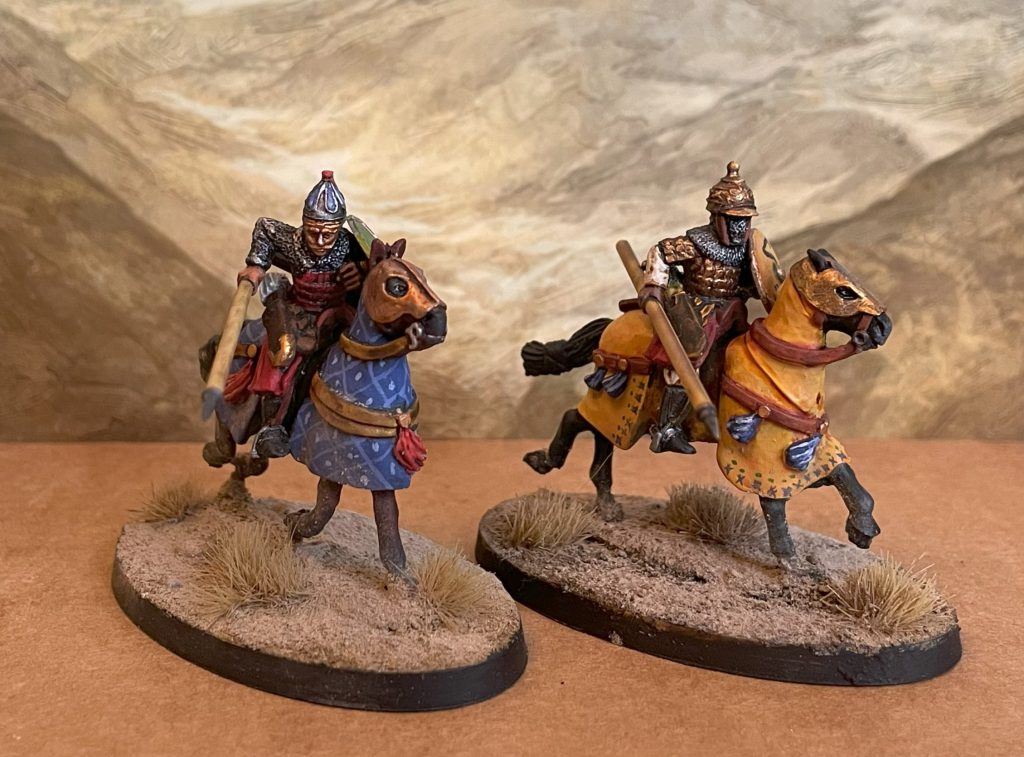
When Usama talks about Mamluks they’re usually described as strong, capable and highly experienced, as above with Yaqut the Tall felling two knights (and horses) with one blow in a battle against the Kingdom of Tripoli. In Egypt, Usama owned six Mamluks – more than we could justify in an Outremer retinue.
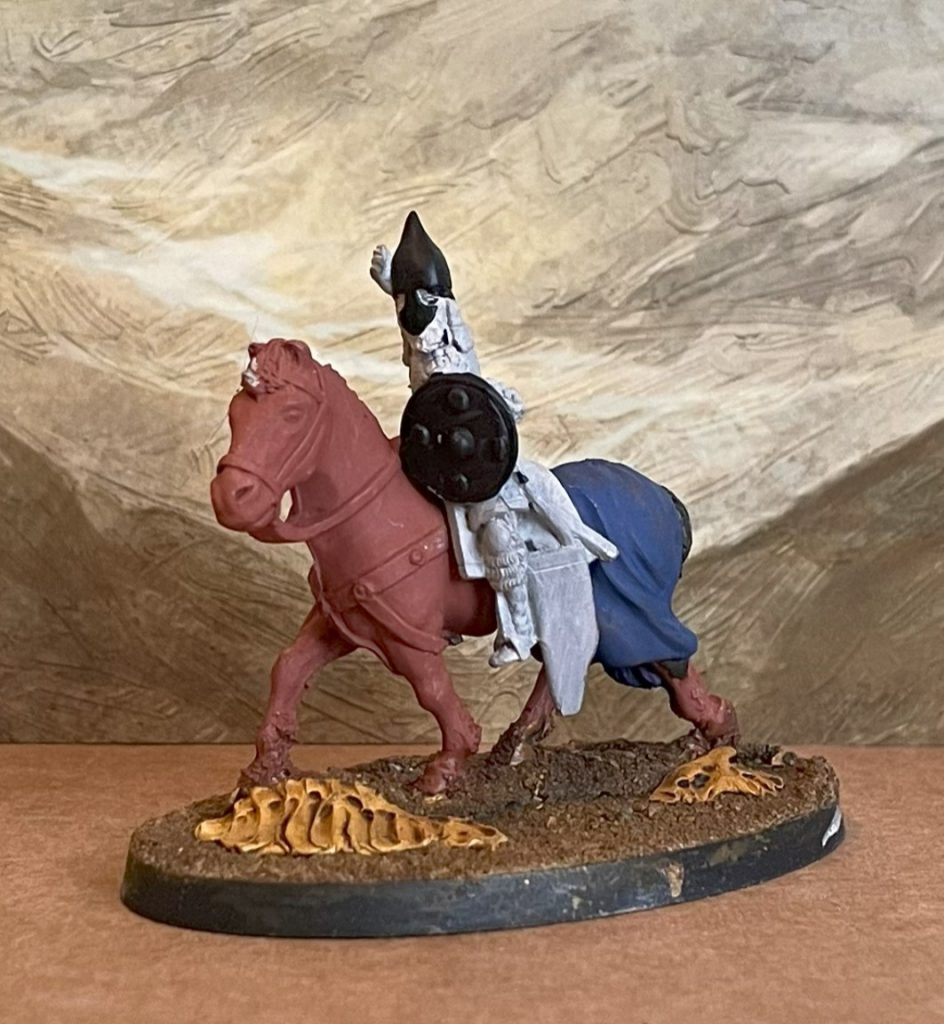
Instead we’ll take three regular Mamluks, with barded horses, composite bows and spears. To show Usama’s great wealth, we’ll take medium shields too, and given his incredibly complimentary tales of the great strength of the Mamluks he knew, they’ll all get the Damascus Steel ability, so that opponents don’t recieve shield rolls – punching right through horse and knight alike! That all comes in at a chunky 84 points. Usama will – as you’d expect – accompany them on the field.
Light Cavalry
Usama was frequently sent off on a variety of diplomatic missions when in Egypt, spending several years travelling across the Crusader states. His various patrons would kit out these expeditions, with Usama only responsible for his own retainers and hangers on. When sent to the court of Nur-al-Din, the Fatmid Vizier Ibn Al-Sallar provided:
He then gave me six thousand Egyptian dinars and a camelload of clothes of Dabigqi cloth, ciclatoun, squirrel-fur, Dimyati brocade and turbans. He also assigned a group of Bedouin to me to act as guides.
These Bedouin troops will be represented by Light Cavalry, kept very simple. Light Cavalry have the glancing blow ability, so can effectively do drive-by (ride-by?) attacks on enemy groups. As a result, I’m going to take another group of three with their stock javelins– irregular this time – to act as a quick thorn in the side of my opponents for 48 points. They’ll get painted soon!
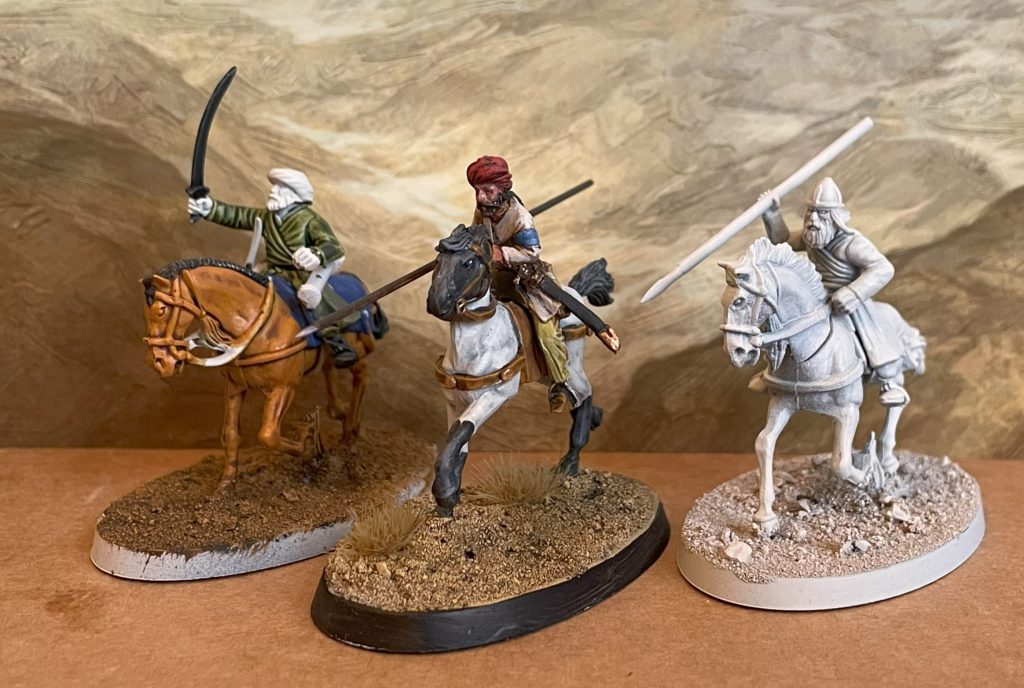
Horse Archers
One of the defining qualities of the Islamic forces in Usama’s writing is that they’re excellent archers, particularly on horseback. His Book of Contemplation is full of anecdotes of exceptional shots, lucky hits, times a lion was killed by one arrow, most of which happen at full gallop. Whether or not they’re strictly true isn’t vitally important – they certainly make for a good story.
They went on ahead at full gallop and met some others, lots of people in quite a crowd. Lu’lu’ was the first to reach them and said, ‘Let’s hear it! Or else I’ll kill you one and all’ — he being an excellent archer.
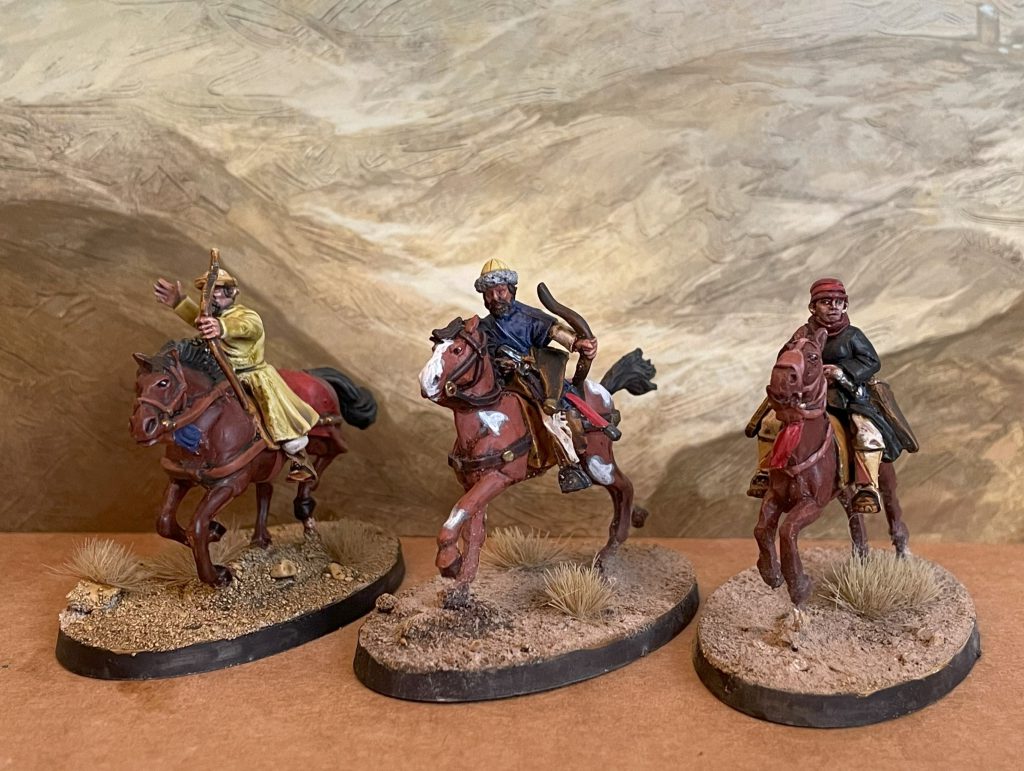
Horse archery was a nightmare for the Crusader armies, becoming increasingly difficult to deal with as pitched battles wore on and a recurrent theme of the ever present skirmishes that Usama writes about. As Usama always talks about the exceptional:
They asked the gatekeeper, ‘What’s the name of this here town?’ The gate was made of wood, with beam-bolts running across the doors, and the gatekeeper was on the inside of the gate.
‘Shayzar,’ he said. At that, they shot an arrow through a gap in the door, turned their horses around and trotted off.
We’re going to take three horse archers of exceptional (veteran) skill. There are a lot of options available to horse archers to represent different areas of the Islamic world, but we’ll keep these base to represent Egyptian and Syrian warriors. A chunky 69 points for three warriors means they’re going to have to pull their weight on the battlefield!
Faris
The Faris class is often compared to Western Knights, which seems fair enough. They were noble, or merely wealthy, semi-professional warriors. Usama himself was a Faris, and had a number of followers, hangers on and friends who would fit the vague bounds of what we would consider a Faris. Usama also fought – and named – many Faris (Farises?) in the various wars between Emirs and nobles concurrent with the wider wars against the Crusaders. His accounts of Faris usually have some kind of wry comment about the frailty of man:
Now one of their horsemen, called Faris ibn Zimam, who was an Arab and a renowned cavalier, rushed past us wanting to put his spear into our companions. But my cousin beat me to him and thrust his spear at him. Both Faris and his horse fell to the ground and my cousin’s spear exploded with such a loud noise that I and everyone else could hear it.
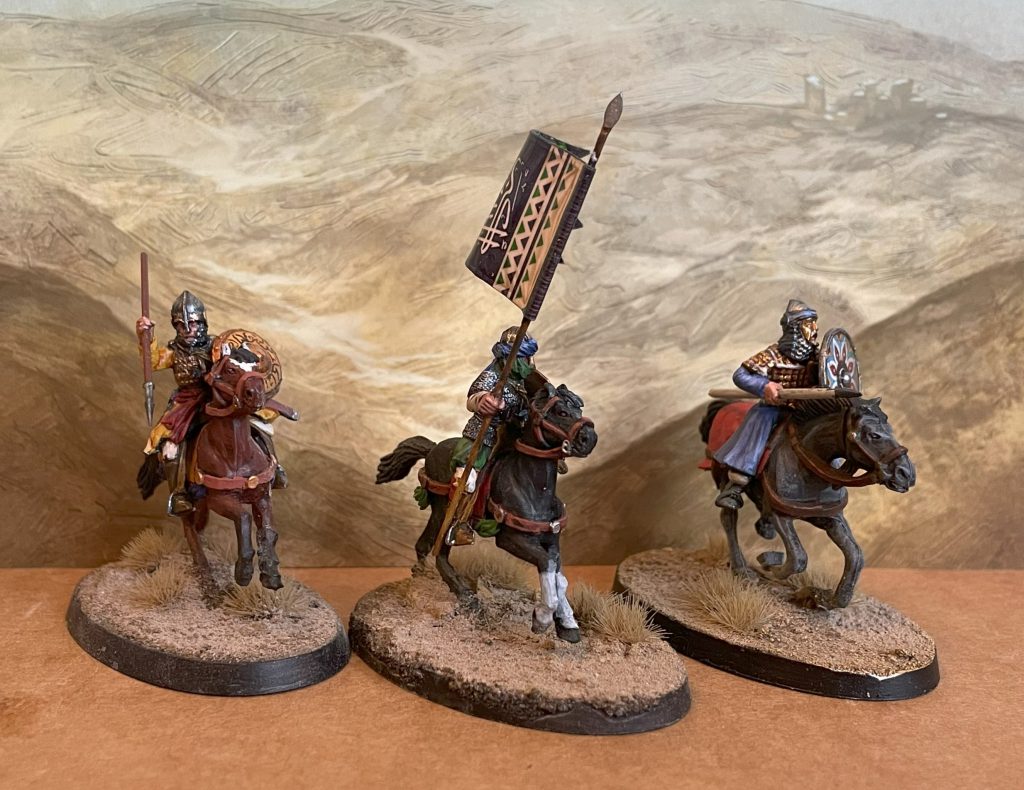
Faris Ibn Zimam in this case managed to fall on his spear – Usama taking the opportunity to talk at length about “a deceptive blow”. We’ll take four Faris at regular to represent their occasionally blunder-filled anecdotes. These will be loaded up with additional swords and shields to give them a little more staying power and give them the ability of Master Horseman, making them exceptionally mobile. That ends up a breathtaking 100 points and probably a list building error!
Bandits and Strange Men
Usama doesn’t write a lot about the infantry he fought alongside – or against. They were, as in many cases of memoirs of this age, seemingly a little beneath his notice. Infantry crop up as exceptional individuals, or bandits, or just the faceless mooks he’s next to at any given moment:
We encountered the advance cavalry of Mahmud ibn Qaraja, who had come into our territory and set up an ambush against us. Once our infantry and his were drawn up at the ready, our cavalry dispersed.
When they do feature at length, they are usually used to show the wisdom of Usama himself:
Those infantrymen whom the Franks had routed came back, blaming one another and saying, ‘Ibn Mungidh knew better than we did. He told us “Go back!” but no, we didn’t do it; now we’ve been routed and disgraced!’
He fought alongside archers and spearmen, so both should be featured. When Spearmen turn up in his anecdotes, they’re usually running away, so a block of Green troops with medium shields, will do the job at 65 points.
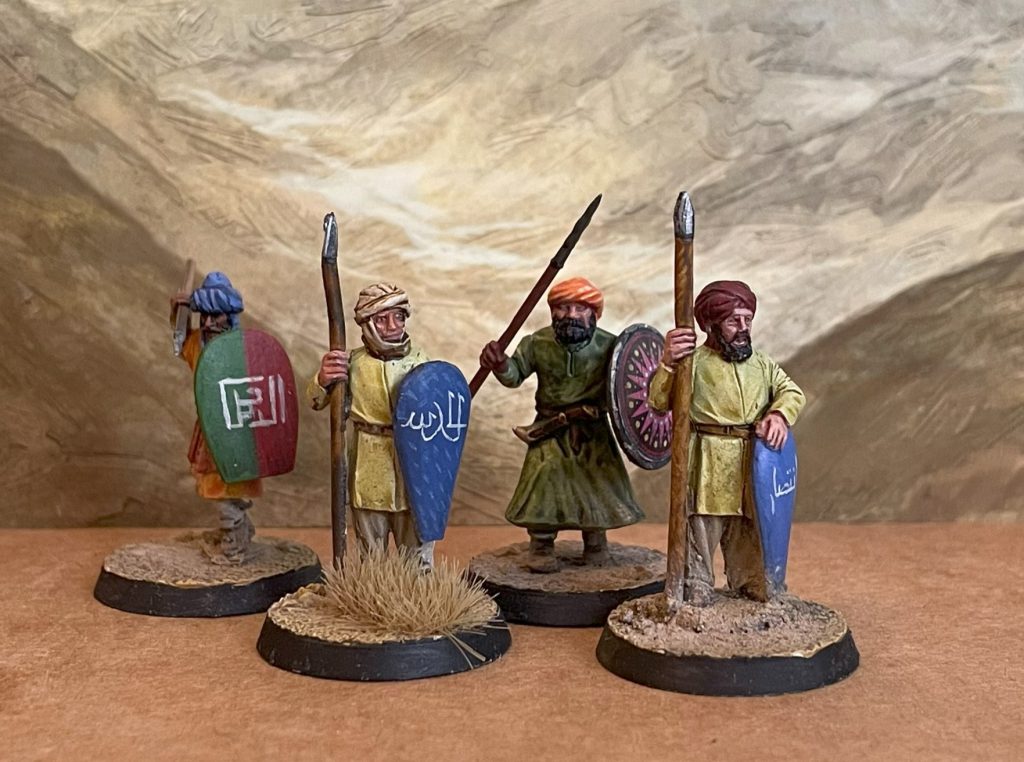
Some of my favourite characters in Usama’s writing are the bandits and strange characters he meets, whether al-Zammarakal:
‘And I suppose, old man,’ Husam al-Dawla continued, ‘that you will just chew through the horses’ tethers with your teeth to get them?’
‘No,’ he said, ‘with this knife.’ And he drew out from inside his clothing a knife fastened by a string and shining like a tongue of flame. He wasn’t wearing any trousers,” either. So we left him there and withdrew.
Or the unnamed Bandit who robbed Usama’s grandfather’s friend:
But he extended his hand, grabbed me by the knees, lifted me off the ground and then beat the ground with me and knelt on me. He took out from his midriff a knife as bright as a flame to kill me, and I cried, ‘Mercy!’
He then got up off me and let me go, saying, ‘Don’t be so contemptuous of your fellow-man.’ He then opened the sack and took a shirt from it and gave it to me
Usama’s bandit anecdotes are split between great thieves and great brawlers, so we’ll take those as 4 Green Archers (44 points) and 4 irregular Daylami infantry (48 points). The Daylami come with a couple of interesting abilities – nimble and born for war – which make them quick into difficult terrain and a real bugger to shift when there, perfect for our tricksy bandits!
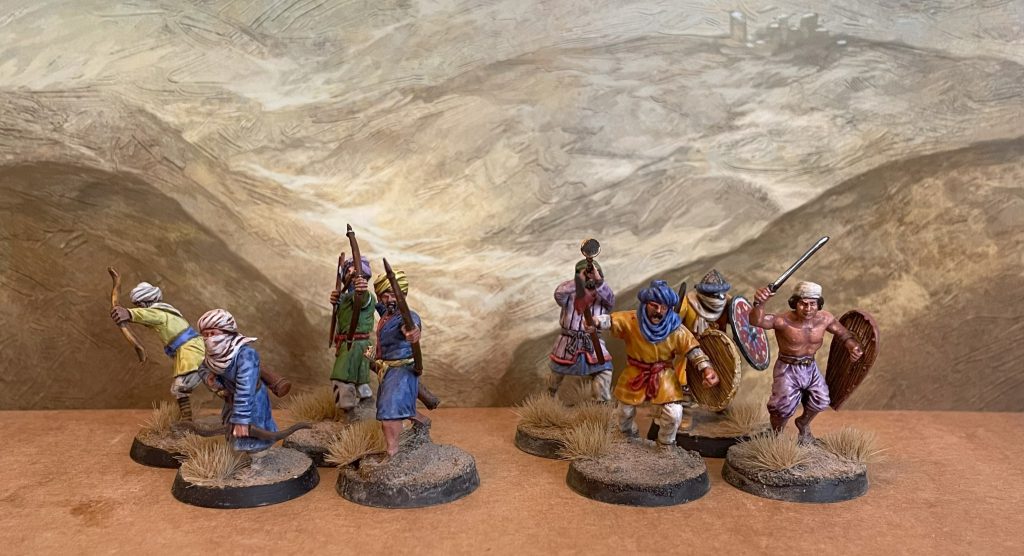
All told that’s 500 points of fairly true to the anecdote Islamic army for Outremer. It’s not making good use of the Askar trait at all, and will wilt at the slightest blow, but Usama’s life wasn’t all straightforward victories. I think far from creating the unstoppable force of Saladin, I’ve created a bit of a ragtag mix of whoever was around, supported by Usama’s retinue and Mamluks, which seems pretty true to Usama’s turbulent years in Egypt and the Crusader states. Hopefully we’ll hit the table soon and this has served as an example of what a read of a good book can make of an army!
Have any questions or feedback? Drop us a note in the comments below or email us at contact@goonhammer.com. Want articles like this linked in your inbox every Monday morning? Sign up for our newsletter. And don’t forget that you can support us on Patreon for backer rewards like early video content, Administratum access, an ad-free experience on our website and more.
